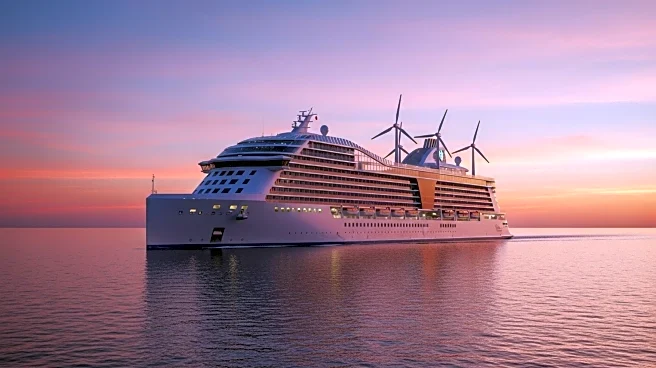What is the story about?
What's Happening?
The Cruise Lines International Association (CLIA) has released its 2025 Environmental Technologies and Practices Report, highlighting significant strides in sustainability within the cruise industry. CLIA's 45 member companies are investing heavily in technological innovations aimed at achieving net zero emissions by 2050. The report details advancements in wastewater treatment, low-emission fuels, and shore-based power systems. Notably, 98.2% of the fleet now generates its own freshwater using steam evaporation and reverse osmosis, while 82.4% have Advanced Wastewater Treatment Systems that exceed MARPOL Annex IV standards. The industry is also moving towards zero-emission fuels, with 19 vessels currently equipped for low-emission operation, and plans for 32 new ships by 2036 that will be ready for alternative fuels like LNG and methanol.
Why It's Important?
The cruise industry's commitment to sustainability is crucial in reducing its environmental impact, particularly in terms of carbon emissions and water management. By adopting zero-emission fuels and advanced wastewater treatment systems, the industry is setting a precedent for other maritime sectors. This shift not only helps mitigate climate change but also aligns with global environmental standards, potentially influencing policy and regulatory frameworks. The advancements in water management ensure that the industry minimizes its ecological footprint, which is vital for preserving marine ecosystems. Stakeholders, including environmental groups and regulatory bodies, stand to benefit from these initiatives as they promote cleaner and more responsible maritime operations.
What's Next?
The cruise industry is expected to continue its investment in sustainable technologies, with plans to expand the use of onshore power supply systems and alternative fuels. By 2036, the number of ships equipped for low-emission operation is projected to increase significantly, alongside the development of ports offering onshore power supply. The EU's Fit for 55 mandate, requiring major European ports to provide OPS by 2030, will likely accelerate these efforts. As the industry progresses towards its net zero emissions goal, further collaborations with environmental organizations and governments may emerge to support these initiatives.
Beyond the Headlines
The cruise industry's move towards sustainability reflects broader trends in the maritime sector, emphasizing the importance of environmental responsibility. These efforts may inspire similar actions in other industries, promoting a shift towards circular economy practices. The adoption of waste-to-energy systems and microbial digesters for food waste highlights the industry's commitment to reducing landfill dependency and enhancing resource efficiency. This transition not only benefits the environment but also positions the cruise industry as a leader in sustainable practices, potentially influencing consumer preferences and market dynamics.















